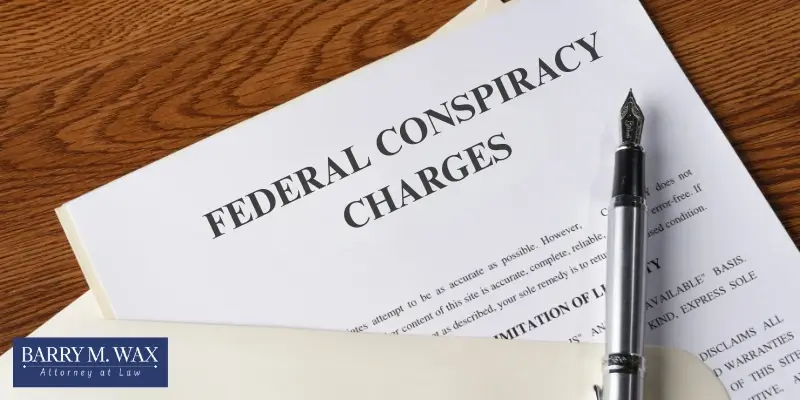Barry M. Wax knows that federal conspiracy charges can be daunting, as these charges often involve serious consequences like prison time and fines. The complexity of federal law and the nature of conspiracy cases can make them especially challenging to navigate on your own. Conspiracy charges typically happen if two or more individuals plan or agree to commit an illegal act, even if the crime wasn’t fully carried out.
Fortunately, there are several defense strategies that can help reduce or even dismiss these charges. From questioning the evidence to challenging whether a true agreement even existed, there are various tools at your disposal to protect your rights if you are facing an accusation. If you are navigating a federal conspiracy case now, understanding your options is the first step toward a strong defense. If you’re facing these charges, an experienced federal conspiracy defense lawyer can look closely at the details of your case and help shape a defense that fits your circumstances.
Common Federal Conspiracy Charges
Federal conspiracy charges can arise from a variety of criminal activities, often involving multiple people planning or agreeing to commit illegal acts. In 2022, it was reported that federal law enforcement made 96,857 arrests for criminal charges. Below lists out common types:
- Drug trafficking conspiracy. One of the most common federal conspiracy charges involves plans to distribute or transport illegal drugs across state or national borders. These cases follow special rules when they go to federal court
- Organized crime conspiracy. Conspiracy to participate in organized criminal activities, such as racketeering, often tied to illegal gambling, loan sharking, or human trafficking.
- Fraud conspiracy. This involves a scheme to commit financial fraud, like wire fraud, bank fraud, or securities fraud. Federal fraud cases have strict time limits for bringing charges.
- Money laundering. Money laundering is when individuals plan or agree to conceal the origins of illegally obtained money, often through complex financial transactions.
- Terrorism conspiracy. This is the planning or agreeing to carry out acts of terrorism, including supporting or planning violent actions for political or ideological purposes.
Each of these charges carries serious penalties, including long prison sentences. If you are facing federal conspiracy charges, it’s important to seek legal support right away to defend your rights effectively.
![Federal Conspiracy How to Defend Against This Charges [2025 Defense Strategies] Federal Conspiracy How to Defend Against This Charges [2025 Defense Strategies]](https://www.barrywax.com/wp-content/uploads/2025/03/defense-strategies-against-federal-conspiracy-charges-1.webp)
How to Defend Against Federal Conspiracy Charges
Defending against federal conspiracy charges requires a careful and strategic approach, as these cases often involve complex evidence and legal elements. However, with the right defense strategies, it’s possible to reduce or even dismiss the charges. Below are common ways to defend against federal conspiracy charges.
Challenge the Existence of a Conspiracy
One of the primary elements the prosecution has to prove in a conspiracy case is that a conspiracy actually existed. If your attorney can prove that there were no agreements or plans to commit a crime, you may have a solid defense. Simply associating with individuals who were involved in illegal activity does not automatically mean that you were part of a plan. You may argue that there was no shared intent or mutual understanding of committing the crime.
Lack of Intent or Knowledge
To be convicted of conspiracy, the prosecution has to show that you had the intent to join in the criminal activity. You can try to show that you did not knowingly participate or that you did not have criminal intent. This, if done well, can weaken the prosecution’s case against you. For example, maybe you were unknowingly involved, or you were coerced into joining the conspiracy. Proving a lack of intent or knowledge can be a key defense strategy.
Withdrawal From the Conspiracy
You may be able to help your case if you can show that you withdrew from the conspiracy prior to committing any illegal activity. This may involve providing evidence that you took steps to distance yourself from the conspiracy. This may include notifying the authorities or making it clear you would no longer participate in the illegal act.
Insufficient Evidence
Conspiracy often hinges on circumstantial evidence like phone calls, meetings, or documents that show or suggest involvement. You may be able to challenge the sufficiency or reliability of this evidence. If the prosecution’s case is based on weak or circumstantial evidence, they may struggle to prove their claims beyond a reasonable doubt.
Plea Bargaining
While not technically a defense strategy, negotiating a plea bargain can sometimes be an ideal strategy in your case, depending on the circumstances. In some cases, you may be able to plead for a lesser charge in exchange for a reduced sentence or other favorable conditions. The plea deal process works differently in federal cases than state cases.
It is important that you take your federal conspiracy case seriously, and if you are facing this charge, explore all potential defenses.
![Federal Conspiracy Charges & How to Defend [2025 Defense Strategies] Federal Conspiracy Charges & How to Defend [2025 Defense Strategies]](https://www.barrywax.com/wp-content/uploads/2025/03/federal-conspiracy-charges-defense-strategies.webp)
FAQs About Federal Conspiracy Law in Miami,FL
What Is a Federal Conspiracy Case?
A federal conspiracy case refers to a criminal charge where two or more people are accused of conspiring or working together to commit an illegal act, and the offense is under federal jurisdiction. This means that the crime in question violates federal laws or crosses state boundaries, which can make it a matter for federal authorities like the FBI or the DEA.
How Do You Beat a Federal Conspiracy Case?
Beating a federal conspiracy case can be challenging, but it’s possible with a strong legal defense. Key strategies may include proving that you did not agree to commit a crime, showing that you didn’t intend to participate, or challenging the evidence that is being used against you. You may also be able to argue that there was no overt act or that the charges are based on weak evidence.
What Is the Sentence for Conspiracy Charges?
The sentence for conspiracy charges will depend on the specific crime involved. For federal conspiracy, sentences can range and are dependent on factors like the severity of the offense and whether the conspiracy involved drugs, terrorism, or violent crimes. Conspiracy convictions often carry very serious penalties like prison time, fines, and supervised release. Penalties are often influenced by other factors like prior criminal history or cooperation with authorities.
What Is a Common Example of a Conspiracy Charge?
One common example of a conspiracy charge involves drug trafficking, especially in places like Miami. This happens when two or more people plan to agree to distribute illegal drugs, like cocaine or heroin. Even if the drugs aren’t actually sold or transported, the agreement to engage in the illegal activity may be enough to charge conspiracy.
Can a Lawyer Help Me With My Federal Conspiracy Case?
Yes, a lawyer can be extremely helpful in a federal conspiracy case. An experienced criminal defense attorney understands federal laws and the complexities of conspiracy charges, so they can offer essential insight into your case. They can review the evidence, challenge weak points in the case, negotiate with prosecutors, and help to build a strong defense. A lawyer can ensure you understand your rights and that you have support through the legal process.
Speak With a Trusted Federal Conspiracy Defense Lawyer Today
Federal conspiracy charges are serious and can have life-altering consequences, but with the right defense, you can fight back. Whether it is to challenge the evidence that is presented against you or questioning intent, an experienced attorney can help you navigate the complexities of your case.
If you are facing charges, seek legal advice as soon as possible to get support in building your defense. A federal conspiracy defense lawyer can evaluate your case, explain your options, and help you take the first steps toward a favorable outcome. Reach out to the Law Offices of Barry M Wax, located on Bricknell Ave in Miami, today to set up an initial consultation and learn more about your legal options.




![Federal Conspiracy How to Defend Against This Charges [2025 Defense Strategies] Federal Conspiracy How to Defend Against This Charges [2025 Defense Strategies]](https://www.barrywax.com/wp-content/uploads/2025/03/defense-strategies-against-federal-conspiracy-charges-1.webp)
